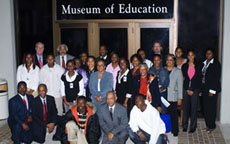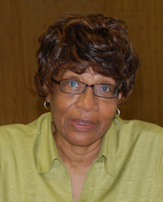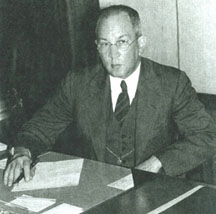

Booker T. Washington High School
The Secondary School Study Web Exhibition |
||||||||||||||||||||
In 1940, Booker T. Washington High School was invited to participate in the Association of Colleges and Secondary Schools for Negroes’ Secondary School Study. Selected and funded by the Rockefeller Foundation, sixteen of the most distinguished black high schools in the United States participated in an experimental program to reexamine administrative, curricular, and instructional practices. The University of South Carolina’s Museum of Education is pleased to feature Booker T. Washington High School and its participation in the study. |
||||||||||||||||||||
|
||||||||||||||||||||
|
Letter of Invitation to Participate in the Study January 23, 1940 |
|||||||||||||||||||
| While the Association sought to achieve accreditation for its member schools and to make strides for equitable support—separate AND equal—for black education, some educators believed teachers were not involved in progressive education’s “stream of educational ideas” and, thus, were placing too much emphasis on traditional instructional practices. For this reason, the Rockefeller Foundation invited distinguished schools to help define promising practices and to serve as a laboratory for determining goals for black youth. | ||||||||||||||||||||
With oral history interviews conducted in October 2008. |
||||||||||||||||||||
Henry Barnes
|
    |
|||||||||||||||||||
|
||||||||||||||||||||
Catherine Hines
|
|
|||||||||||||||||||
|
||||||||||||||||||||
and with great appreciation to Mr. Reuben C. Blackwell, IV and Ms. Clara Knight of the Opportunities Industrialization Center, Rocky Mount, who assisted with the oral history interview process of this research and who provided space to conduct the interviews. |
||||||||||||||||||||
 Mary Perry “The teachers established a family type atmosphere where they made us feel at home. We were never afraid, and they were so patient with us. There was a lot of love and caring for students. I wish the students of today had the same experience that we had. Our teachers wanted us to further our education and to succeed in what they knew was a difficult world.” Mary Perry |
The Museum of Education’s Web Exhibitions center primarily on the academic life of individual schools during the 1940s and early 1950s, the focus of the Secondary School Study. Our vignettes serve not to lessen the accomplishments and accolades from prior or subsequent decades nor do they diminish the significance of the social and athletic dimensions of school life. Instead, the Museum presents web exhibitions of the Secondary School Study schools as a way to feature the experimental efforts of progressive educators during the 1940s. Since these vignettes were not prepared to serve as school histories, we encourage alumni and historians to prepare their own comprehensive school accounts, histories, and memoirs of these important educational institutions.
|
|||||||||||||||||||
|
|
|||||||||||||||||||
These web exhibitions have been prepared for a general audience and have not used professional terminology from the field of education. Our accounts are intentionally free of detailed bibliographic citations. The curator is currently writing a scholarly account of this project that follows accepted bibliographic practices. Further, these exhibitions are conceived within a tradition of progressive education where a fruitful experience raises as many questions as it answers. Thus, the information on the various sites has been crafted intentionally to be suggestive—to allow important questions "to float" through the exhibitions rather than to be answered with questionable certainty. These sites are works-in-progress and represent an "educational research charrette" as additional historical material is discovered and fresh memories, recollections, and insights come forth by participants and other researchers. |
||||||||||||||||||||
|
||||||||||||||||||||
The Museum of Education continues its efforts to portray progressive education experimentation in African American school settings. The Museum of Education thanks those teachers and students who have graciously loaned materials for duplication and who have participated in the Museum of Education’s Secondary School Study Oral History Project. For those individuals who wish to share documents from the 1940s, please write the curator at Museumofeducation@sc.edu
|
||||||||||||||||||||
 |
Specifically, the Museum is attempting to contact the following Booker T. Washington High School students who are shown in this photograph: |
|||||||||||||||||||

an institutional member of the International Coalition of Sites of Conscience
Museumofed@gmail.com














